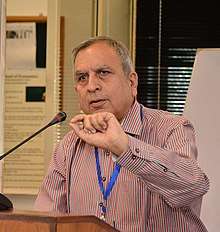Ismat Beg
| Ismat Beg | |
|---|---|
 Ismat Beg at the RAMMMA 2018 conference | |
| Born | Mohri Sharif,Gujrat District |
| Residence | Lahore, Pakistan |
| Nationality | Pakistani |
| Citizenship | Pakistan |
| Alma mater | University of Bucharest Government College University (Lahore) |
| Known for | His work on the mathematical sciences, Fixed-point theorem, Fuzzy set, Order theory, Multiple-criteria decision analysis ,TOPSIS |
| Awards | Pakistan Academy of Sciences Gold Medal in 2008[1] |
| Scientific career | |
| Fields | Mathematics |
| Institutions |
Lahore School of Economics Lahore University of Management Sciences Kuwait University Quaid-i-Azam University International Centre for Theoretical Physics Pakistan Navy Engineering College Nankai University University of Central Punjab |
| Doctoral advisor | Romulus Cristescu |
| Notable students | Naseer Shahzad |
Ismat Beg (Urdu: عصمت بیگ; born January 1951) is a Pakistani mathematician and researcher. He is Professor at Lahore School of Economics[2]. Beg is also a Higher Education Commission Distinguished National Professor[3] and an honorary full professor at the Mathematics Division of the Institute for Basic Research, Florida, US.
Early life and education
Ismat Beg was born in Mohri Sharif, in 1951 to a migrated Kashmiri family. He got his primary schooling in village school sitting under trees. In 1961 his father took him to Risalpur and he was sent to Sapper Boys High School, Risalpur Cantt. After passing Secondary School Certificate in 1966 he joined Zamindar College, Bhimber Road, Gujrat for Higher Secondary School Certificate and Bachelor of Science. He did his master from Government College, Lahore (now Government College University (Lahore)). In 1977, Beg travelled to Romania on a scholarship which he applied and qualified. In 1977-78, Beg attended the West University of Timișoara for Romanian language and pre-doctoral courses and passed the PhD entrance exam for University of Bucharest. He started his PhD in fall of 1978 under the supervision of Academician Romulus Cristescu[4]. His area of research is ordered vector spaces and linear operators with specialization in integral representation of linear operators. He defended his thesis in December 1981 and degree was awarded in 1982[5]. Beg's scientific contributions cover a wide range of topics spanning fixed point theory and approximations, fuzzy sets and systems, artificial intelligence and multicriteria decision theory.[6][7]
Academic career
Ismat Beg started teaching just after his PhD in 1982 and has served[1][2][8] in
- Lahore School of Economics
- Lahore University of Management Sciences
- Kuwait University
- Quaid-i-Azam University
- International Centre for Theoretical Physics
- Pakistan Navy Engineering College
- Nankai University
- University of Central Punjab
He has published research papers in the fields of mathematics, computer science, economics, game theory, engineering, decision theory and social sciences that have been well cited by other researchers.[9][10] He has contributed to the fields of fixed point theory, fuzzy set theory, order structures, preference modeling and multi-criteria multi-agent decision making[9][11] Beg has supervised 12 M.Phil. theses, 7 Ph.D. dissertations, and 10 post doctoral researchers.[4] He is member of the editorial boards of
- Proceeding Pakistan Academy of Sciences[12]
- Journal Function Spaces[13]
- Punjab University Journal of Mathematics[14]
- Big Data Analytics for Healthcare[15]
and several other international journals.
Awards and honours
- Distinguished National Professor, Higher Education Commission of Pakistan [3]
- Prize, National Book Council of Pakistan, 1986
- Gold Medal, Pakistan Academy of Sciences 2008 [1]
- Visiting Mathematician/Associate Group Member/Senior Mathematician/Senior Guest Scientist, International Centre for Theoretical Physics Trieste, Italy, 1990–2010.
- Academic Roll of Honor from Government College University (Lahore) 1972
Fellowships and memberships
- Fellow of the Pakistan Academy of Sciences[1]
- Elected fellow of the Institute of Mathematics and its Applications (United Kingdom).[1]
- Member, American Mathematical Society[1]
- Member London Mathematical Society[1]
- Member European Mathematical Society[1]
- Chartered Mathematician[1]
- Member, European Society for Fuzzy Logic and Technology Working group “Intuitionistic Fuzzy Sets: Theory, Applications and Related Topics".
- Life member All Pakistan Mathematical Association[16]
Recent publications
The following are some of his recent publications in the area of fuzzy set theory:
- Beg, Ismat; Rashid, Tabasam (2013-08-02). "TOPSIS for Hesitant Fuzzy Linguistic Term Sets". International Journal of Intelligent Systems. 28 (12): 1162–1171. doi:10.1002/int.21623. ISSN 0884-8173.
- Beg, I.; Gopal, D.; Došenović, T.; Rakić, D. (30 June 2018). "α-type fuzzy H-contractive mappings in fuzzy metric spaces". Fixed Point Theory. 19 (2): 463–474. doi:10.24193/fpt-ro.2018.2.37.
- Rashid, Tabasam; Beg, Ismat; Husnine, Syed Muhammad (August 2014). "Robot selection by using generalized interval-valued fuzzy numbers with TOPSIS". Applied Soft Computing. 21: 462–468. doi:10.1016/j.asoc.2014.04.002.
- Khalid, Asma; Beg, Ismat (June 2016). "Incomplete interval valued fuzzy preference relations". Information Sciences. 348: 15–24. doi:10.1016/j.ins.2016.02.013.
- Beg, Ismat; Rashid, Tabasam; Jamil, Raja Noshad (2018-07-03). "Human attitude analysis based on fuzzy soft differential equations with Bonferroni mean". Computational and Applied Mathematics. 37 (3): 2632–2647. doi:10.1007/s40314-017-0469-2. ISSN 0101-8205.
See also
References
- 1 2 3 4 5 6 7 8 9 "Fellow Profile". www.paspk.org. Pakistan Academy of Sciences. Retrieved 2018-06-22.
- 1 2 "Dr ismat Beg". www.lahoreschoolofeconomics.edu.pk. Lahore School of Economics. Retrieved 2018-06-22.
- 1 2 http://www.paspk.org/wp-content/uploads/2017/08/NewsLetter-July-2017.pdf
- 1 2 "Ismat Beg". www.genealogy.math.ndsu.nodak.edu. The Mathematics Genealogy Project. Retrieved 2018-06-22.
- ↑ "Romulus Cristescu - The Mathematics Genealogy Project". www.genealogy.math.ndsu.nodak.edu.
- ↑ https://www.mcdmsociety.org/members
- ↑ PhD, Ismat BegLahore School of Economics 47 48 ·. "Ismat Beg - PhD - Lahore School of Economics, Lahore". ResearchGate.
- ↑ Economics, Lahore School of. "Centre For Mathematics & Statistical Sciences". www.lahoreschoolofeconomics.edu.pk.
- 1 2 "Ismat A Beg C-3015-2008". ResearcherID. Clarivate Analytics. Retrieved 2018-07-28.
- ↑ "Scopus preview - Scopus - Author details (Beg, Ismat)". Scopus. Elsevier. Retrieved 2018-07-28.
- ↑ "Ismat Beg - Google Scholar Citations". scholar.google.com.pk. Retrieved 2018-06-22.
- ↑ http://www.paspk.org/wp-content/uploads/2015/12/Editorial-Board_Journal-A.pdf
- ↑ Hindawi. "Journal of Function Spaces - An Open Access Journal". www.hindawi.com.
- ↑ "Punjab University Journal of Mathematics - Editorial Board". pu.edu.pk.
- ↑ "Editorial Team". ojs.whioce.com.
- ↑ "Life members". 5 January 2009.